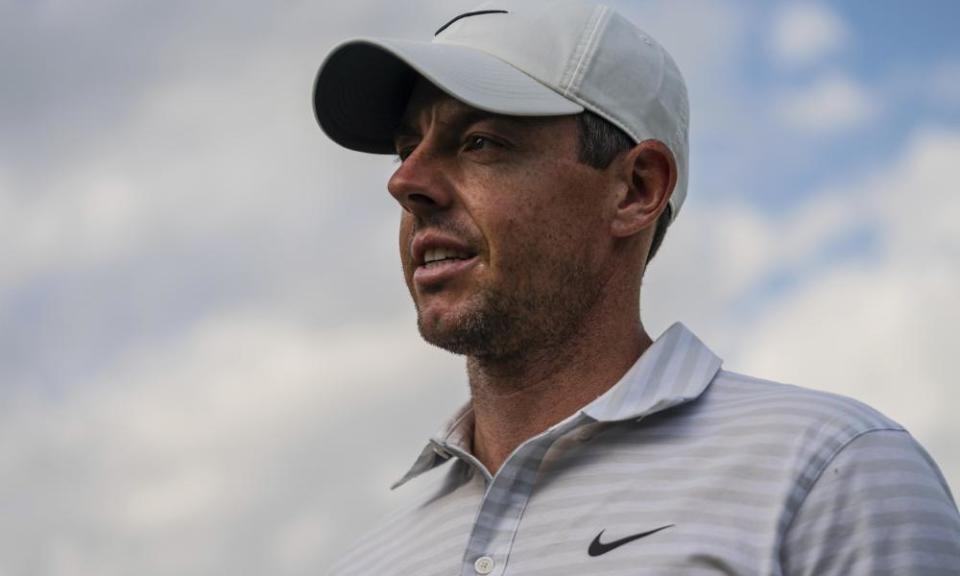After football’s revolt, where is the outcry over golf’s Saudi-led breakaway?
People often ask about the difference in media approach between top-level footballers and golfers. The widespread understanding would be that football players, bereft of educational qualifications, have a cynical attitude towards the press drilled into them within clubs and treat reporters accordingly. Golfers, often with at least an element of the US college system on their CV, comprehend the need to keep both tour and individual sponsors happy and therefore treat media duties as a core responsibility.
In some respects that generalisation is correct. In many others it is grossly unfair. Footballers encounter a level of media criticism that is rarely, if ever, bestowed on golfers. Premier League players are subject to a scrutiny, personal and professional, that would be totally alien even to Rory McIlroy. Golfers making front pages is a rare thing indeed but that shouldn’t lead us to believe they are all as pure as the driven snow.
Related: Golfers warned signing for breakaway tour will lead to PGA Tour ban
A bad on-course performance – Ryder Cups etc aside – only impacts on that one player. When footballers appear in front of a microphone following a dismal result, the ire of supporters funnels back through online channels. The cosiness of broadcast partnerships means you are not likely to see outbursts from golfers – aimed at their caddie, the course or otherwise – on mainstream coverage. Not good for the brand.
In short, golfers lead a pretty charmed life. That was worthy of attention as the sport’s breakaway tour shot back to prominence last week. As has tended to be the norm with this project, it duly disappeared from broader discourse. And no wonder; when Phil Mickelson, a key target for the Saudi Arabia-backed Super Golf League, performed his media podium duties after an opening round of 64 at the Wells Fargo Championship, two of the four questions posed related to his use of a two-wood.
Bryson DeChambeau’s more expansive conferences also stayed well clear of what McIlroy branded a “money grab”. Mickelson, DeChambeau and others can apparently entertain offers from the Saudis of eye-watering sums of money without anyone focusing on why they might associate with such a controversial – or abhorrent, depending on one’s level of background reading – regime. Authoritarianism for golfers? “How big is the cheque?”

Justin Rose and his team are rightly proud of the former world No 1’s ladies series that provides valuable tournament opportunity in the UK. Yet, as Rose was linked with the Super League, there was not a hint of his management distancing their client from Saudi cash. The kingdom’s human rights violations are widely known, with Amnesty International’s website stating in 2020: “Women and girls continued to face discrimination in law and practice in relation to marriage, divorce and inheritance, and remained inadequately protected from sexual and other forms of violence.” How does this square with Rose’s ladies series commitment?
On a more general but similarly grim theme, Amnesty added: “Repression of the rights to freedom of expression, association and assembly intensified. Among those harassed, arbitrarily detained, prosecuted and/or jailed were government critics, women’s rights activists, human rights defenders, relatives of activists, journalists, members of the Shi’a minority and online critics of government responses to the Covid-19 pandemic.”
When the European Super League crashed, it was against a backdrop of fury from fans. There is no golf equivalent of that
The Saudi golf scheme is unpalatable enough to many on the basis it has clearly antagonised the PGA Tour, European Tour, PGA of America and United States Golf Association. The viability of the Ryder Cup would be brought into question. The R&A and Augusta National, not prone to public comment, said enough in brief statements for us to deduce they are not keen either. Nor should they be; relationships with Saudi Arabia would be totally, unacceptably at odds with the progress these groups are responsible for overseeing in golf. Players either have not contemplated that dichotomy or do not care.
When the European Super League crashed around the ears of the very executives who thought they had devised the perfect closed shop, it was against the backdrop of fury from supporters. There is no golf equivalent of that; save the Ryder Cup, which takes place once every two years, this really is not a tribal environment. Another key difference is that football clubs had already committed to their lucrative breakaway. Golfers have thus far only been in lengthy negotiations over a plan that would result in the PGA and European Tours losing players to a 14-event global environment where team and individual elements combine.
What the two sports and their renegade models do have in common are negotiators; in golf’s case managers or agents, who – typically, not exclusively – are rather fond of dollar signs and must therefore be viewed with suspicion in context of what they regard as preferable for the future of the sport. Any player agreeing a $100m Saudi contract – and make no mistake, they could – would benefit the middle man to an extent where application of the death penalty may not be uppermost in thinking.
It is where the money emanates from that is more significant to this scheme than the fact it is being proposed in the first place. However, when the Saudis can operate in golf’s shadows – no press conferences, no briefings, no visible public relations at all – and those they pursue are not probed on the ethics of what they might be about to leap into, all involved are entitled to believe a watching world does not care. Those in certain football club boardrooms, castigated and ridiculed to the point of highly embarrassing U-turn, should raise an eyebrow.

 Yahoo Sport
Yahoo Sport 





































